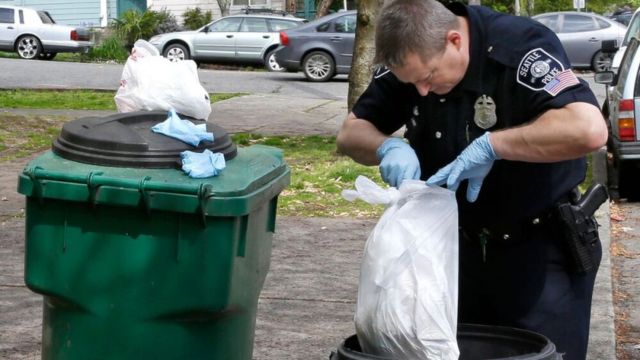GBBC –
In Iowa, as in the rest of the United States, citizens are protected by the Fourth Amendment, which safeguards against unreasonable searches and seizures.
This means that, in most cases, police cannot search your personal belongings—such as your bag, backpack, or purse—without a warrant. However, there are exceptions to this rule, and understanding when the police can legally search your belongings is crucial.
Here’s what you need to know about police searches of your bag in Iowa, including the circumstances where they might be allowed to do so without a warrant.
1. Your Constitutional Rights: The Fourth Amendment
The Fourth Amendment of the U.S. Constitution protects citizens from unreasonable searches and seizures. It states that police generally need a warrant—issued by a judge—based on probable cause to conduct a search of a person’s property. This includes bags, backpacks, or any other personal items that you carry with you.
However, this right is not absolute. There are specific exceptions that allow police to conduct searches without a warrant. These exceptions are generally based on the idea that certain situations justify an immediate search to protect the safety of officers or the public, or to preserve evidence.
2. Exceptions to the Warrant Requirement
While a warrant is usually required, there are several key exceptions where police can search your bag without a warrant in Iowa. Some of these exceptions include:
A. Consent
If you voluntarily give police permission to search your bag, they do not need a warrant. Police must ask for consent, and you have the right to refuse the search. However, if you agree to the search, any evidence found may be used against you in court.
Example: If an officer asks, “Can I search your bag?” and you say “Yes,” then you’ve consented to the search. It’s important to note that your consent must be given voluntarily, and the officer cannot pressure or coerce you into allowing the search.
B. Search Incident to Arrest
If you are arrested, police are allowed to search your immediate area—including your bag—without a warrant as part of the arrest process. This is known as a “search incident to arrest.” The purpose of this search is to ensure that you don’t have weapons, tools that could help you escape, or evidence related to the crime you were arrested for.
Example: If you are stopped by police, arrested for a crime, and your bag is within reach, the officer may search it without a warrant to ensure there are no weapons or evidence that could be destroyed.
C. Plain View Doctrine
If an officer is lawfully present in a location and sees evidence of a crime in plain view, they are allowed to seize it without a warrant. This can apply to a bag if an officer, for example, sees illegal drugs or weapons inside it while they are legally searching other parts of your property.
Example: If you are sitting in your car, and an officer sees illegal items in your bag through the window, they can seize those items without a warrant.
D. Exigent Circumstances
In certain situations where there is an emergency or immediate threat to public safety or evidence, police may conduct a search without a warrant under the “exigent circumstances” exception. This could include situations where the police believe there is a threat of harm or a risk that evidence may be destroyed if they don’t act quickly.
Example: If police believe you are carrying a dangerous weapon or evidence of a serious crime, they may search your bag without a warrant to prevent harm or destruction of evidence.
E. Probable Cause in a Vehicle Search
If you are in a vehicle, and police have probable cause to believe that there is evidence of a crime in your bag, they may search the bag as part of a search of the vehicle, even without a warrant. This is often done during traffic stops when officers suspect that there may be illegal contraband or evidence inside the car.
Example: If police pull you over and smell marijuana in the car, they may search your bag without a warrant if they have reason to believe it contains drugs or drug paraphernalia.
3. What to Do if You’re Stopped by Police

If you’re stopped by police and they ask to search your bag, it’s important to know your rights. You are not obligated to consent to a search unless one of the exceptions mentioned above applies.
Here are some important tips:
- Know Your Rights: If an officer asks to search your bag, you have the right to refuse. Politely and clearly state that you do not consent to the search.
- Stay Calm and Respectful: If the officer proceeds with a search despite your refusal, stay calm and respectful. You can always contest the search later in court, but becoming argumentative or aggressive may only escalate the situation.
- Ask if You’re Free to Leave: If you’re not being detained or arrested, you can ask if you’re free to leave. If the officer says yes, you may walk away, but if they say no, you should comply.
- Document the Encounter: If you believe your rights were violated, try to take note of the officer’s name, badge number, and any details about the search. You can file a complaint or seek legal advice later.
4. What Happens if the Search is Unlawful?
Without! Can Police Search Your Bag in New Jersey Without a Warrant? Here’s What You Need to Know
If police search your bag without a warrant and without a legal exception, anything they find during that search may be inadmissible in court. This is known as the “exclusionary rule.” If you believe a search of your bag was unlawful, you can consult with an attorney to explore your options for challenging the evidence.
In Iowa, police generally cannot search your bag without a warrant, but there are several exceptions that may allow them to do so, including if you give consent, if you’re arrested, or if they have probable cause or an emergency situation.
Understanding your rights and knowing when a search is permissible can help protect you from illegal searches. Always be aware of your surroundings, and if in doubt, politely refuse consent for a search and contact an attorney if you believe your rights have been violated.




More Stories
Without! Can Police Search Your Bag in Iowa Without a Warrant? Here’s What You Need to Know
Without! Can Police Search Your Bag in Iowa Without a Warrant? Here’s What You Need to Know
Without! Can Police Search Your Bag in Iowa Without a Warrant? Here’s What You Need to Know